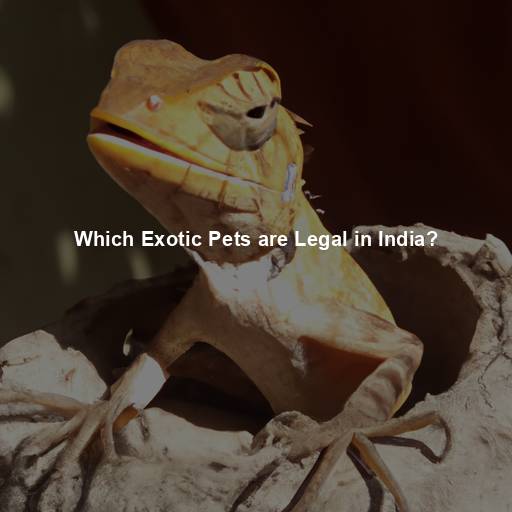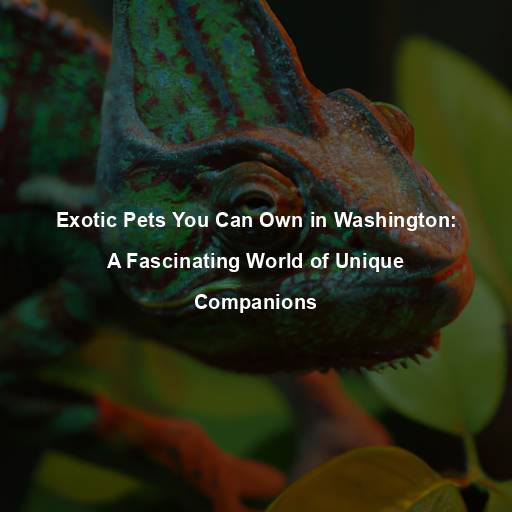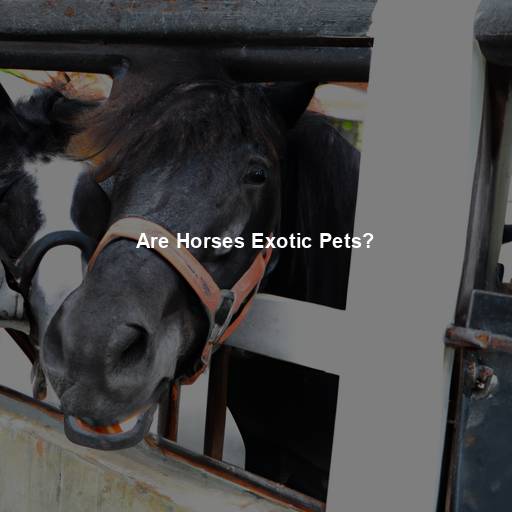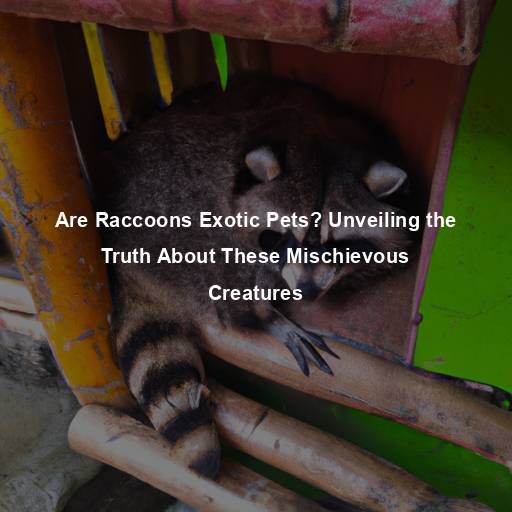Which Exotic Pets are Legal in India?
Last Updated on August 5, 2023 by Evan
Contents [hide]
- 1 A Comprehensive Guide to Owning Exotic Pets in India
- 2 The Challenges of Exotic Pet Ownership
- 3 The Role of Education and Awareness
- 4 Choosing the Right Exotic Pet
- 5 FAQs: Which Exotic Pets are Legal in India?
A Comprehensive Guide to Owning Exotic Pets in India
India, with its rich biodiversity and vibrant wildlife, has always been a country that celebrates its diverse flora and fauna. From majestic tigers to colorful birds, India is home to a wide range of exotic animals that captivate the imagination. It’s no wonder that many animal enthusiasts are drawn to the idea of owning an exotic pet. But before you embark on this unique journey, it’s essential to understand the legalities and responsibilities that come with it.
Understanding the Legal Landscape
India, like many other countries, has regulations in place to protect both the welfare of animals and the safety of its citizens. The Wildlife Protection Act of 1972 is the primary legislation that governs the ownership and trade of wildlife in India. Under this act, certain species are categorized as “protected” or “scheduled” and are prohibited from being owned as pets. These species are protected to ensure their conservation and prevent their exploitation.
Legal Exotic Pets in India
While some exotic pets are prohibited, there are several species that you can legally own in India. It’s important to note that the legality of owning an exotic pet can vary from state to state, so it’s crucial to familiarize yourself with the specific regulations in your area. Here are some of the popular exotic pets that are legal to own in India:
- Guinea Pigs: These small, sociable rodents make great pets and are legal to own in India. They require a dedicated owner who can provide them with a suitable habitat, a balanced diet, and regular veterinary care.
With their captivating charm and mischievous antics, rabbits have claimed a special place in the hearts of pet lovers across India. These adorable creatures have become sought-after companions, spreading joy and laughter in households of all ages. While owning a bunny is legal and surely brings delight, it’s important to create a suitable environment that allows for their energetic frolics and to provide them with a wholesome diet, ensuring their overall health and happiness.
-
Budgerigars: These small, colorful parakeets are a common sight in many Indian households. Budgerigars, also known as budgies or lovebirds, are legal to own and can be delightful companions with proper care and attention.
-
Goldfish: Goldfish are one of the most popular aquarium fish worldwide, and they are legal to own in India. They are relatively low-maintenance pets, but it’s crucial to provide them with a suitable tank and regular water maintenance.
-
Tortoises: Certain species of tortoises, such as the Indian star tortoise and the red-eared slider, are legal to own in India. However, it’s important to note that tortoises have specific habitat and dietary requirements, and their long lifespan means they require a long-term commitment.
Discover the captivating world of tarantulas, a thrilling choice for those seeking an unconventional pet. These intriguing eight-legged creatures, legally owned in India, offer a mesmerizing experience. However, catering to their venomous tendencies demands expert care and delicate handling, adding an element of excitement and responsibility to the owner’s journey. Explore the enigmatic realm of tarantulas and unlock the secrets of their captivating allure.
Responsible Pet Ownership
Owning an exotic pet comes with significant responsibilities. It’s crucial to remember that these animals have specific needs and requirements that must be met for their well-being. Here are some key aspects of responsible pet ownership for exotic pets:
Research and Education
Before bringing an exotic pet into your home, it’s essential to thoroughly research the species you are interested in. Understand their natural habitat, dietary needs, environmental requirements, and any specific care guidelines. Education is key to providing the best possible care for your pet.
Proper Habitat and Enrichment
Create a suitable habitat for your exotic pet that mimics their natural environment as closely as possible. Ensure that the enclosure or tank is spacious enough, has appropriate temperature and humidity levels, and provides opportunities for mental and physical stimulation.
Veterinary Care
Owning an exotic pet comes with its own set of responsibilities, and ensuring their well-being should be at the top of your priority list. One way to navigate this complex journey is through regular veterinary care, tailored specifically to the needs and uniqueness of your beloved companion. From finding a seasoned veterinarian with a deep understanding of your pet’s species to scheduling routine check-ups that encompass vaccinations, parasite prevention, and dental care, it’s vital to weave a safety net of healthcare to protect and nurture your exotic friend in this vast and perplexing world.
Legal Compliance
When it comes to expanding your furry (or not-so-furry) family with a touch of the exotic, navigating the regulatory jungle can be a perplexing journey. It’s crucial to burst forth with compliance, ensuring you’re up to snuff with the regulations that govern the ownership of these enigmatic creatures in your area. Take the time to unlock the secrets of permits and licenses, like a modern-day Indiana Jones of the pet world, to avoid any unlawful shenanigans that could jeopardize both your conscience and the protection of precious wildlife species.
Ethical Concerns Surrounding Exotic Pet Ownership
Owning a one-of-a-kind pet may tickle your fancy, but it’s crucial to ponder the ethical dilemmas lurking in the shadows. These enigmatic creatures suffer immensely when snatched away from their homes and hurled into a disorienting web of chaos during the journey. Moreover, the whirlwind desire for exotic pets ignites a sinister underworld of illegal wildlife trading, pushing our wild brethren to the brink of extinction and unsettling the delicate balance of biodiversity.
Conservation and Sustainability
The protection and restriction of certain exotic animal species as pets serve a crucial purpose: safeguarding their existence in the wild and fostering sustainability. By allowing these captivating creatures to remain in their natural habitats, we grant them the opportunity to play their vital role in maintaining ecological harmony and upholding flourishing populations. Embracing the ideals of responsible pet ownership entails actively championing conservation endeavors and appreciating the value of safeguarding Earth’s diverse tapestry of life.
Alternatives to Exotic Pets
If you have an innate curiosity for the captivating realm of the animal kingdom, yet find yourself grappling with the ethical complexities tied to owning exotic pets, fear not! There exists a kaleidoscope of alternatives to satiate your craving for wildlife adventures. Immerse yourself in the realms of wildlife sanctuaries, where majestic creatures encompassing the breadth of the animal kingdom await your awe-struck gaze. Enrich your soul by offering your valuable time and compassion as a volunteer at animal rescue centers, lending a helping hand to the voiceless in their journey to a better life.
The Challenges of Exotic Pet Ownership
Specialized Care Requirements
Caring for exotic pets can be quite the baffling task as these extraordinary creatures come with a myriad of unique demands. From intricate diets that require careful planning and provisioning to creating complex environments that mimic their natural habitats, the journey is both demanding and time-intensive. Before diving headfirst into the thrilling world of exotic pets, it is absolutely imperative to delve into thorough and comprehensive research, gaining a profound understanding of the specific needs of the species you aspire to care for.
Health and Safety Risks
Exotic animals can pose health and safety risks to both their owners and the public. Many exotic species carry zoonotic diseases that can be transmitted to humans, such as salmonella or certain parasites. Additionally, some exotic pets may display aggressive or unpredictable behavior, posing a risk to those who interact with them. Proper hygiene practices, regular veterinary care, and responsible handling are crucial for mitigating these risks.
Long-Term Commitment
Exotic pets often have long lifespans, which means that owning one requires a long-term commitment. Before bringing an exotic animal into your home, consider the implications of caring for them for potentially decades. Ensure that you have the time, resources, and dedication to provide for their needs throughout their entire lifespan.
The Role of Education and Awareness
Educating the Public
One of the most effective ways to address the challenges and ethical concerns surrounding exotic pet ownership is through education and awareness. By promoting responsible pet ownership and providing accurate information about the needs and welfare of exotic animals, we can empower individuals to make informed decisions and create a more compassionate society.
Collaboration with Conservation Organizations
Conservation organizations play a vital role in raising awareness about the conservation status of exotic species and the impact of the pet trade on their populations. By collaborating with these organizations, pet owners can gain valuable insights into the specific needs of the species they are interested in and contribute to conservation efforts.
Encouraging Legislation and Regulation
Safeguarding the well-being of captivating wild creatures and thwarting the deplorable underworld of illicit pet trafficking evidently necessitates a steadfast dedication to fortified laws and regulations. It is of utmost importance to champion the cause of fostering conscientious ownership, upholding principled conduct, and clamping down on the trafficking of jeopardized species. Embracing such measures will undoubtedly establish an atmosphere that ensures the coexistence of animals and humans in a secure and harmonious sanctuary.
Unique Companionship
There’s an undeniable allure in the companionship provided by exotic pets – a rather perplexing aspect that draws many towards them. These extraordinary creatures possess an assortment of captivating personalities and behaviors, making it a truly awe-inspiring experience to simply observe and engage with them. From the whimsical, lively antics of a rabbit to the elegant, mesmerizing movements of a tortoise, having an exotic pet can bring an unparalleled sense of wonder and bliss to our existence.
Educational Opportunities
Owning a unique and unconventional pet can be transformative, particularly for young minds seeking unconventional experiences. Engaging with a menagerie of extraordinary creatures allows individuals, especially children, to embark on a fascinating journey of discovery. These captivating companions not only offer a hands-on education in the wonders of the natural world, but also instill a profound sense of curiosity and reverence for the tapestry of life that envelops our planet. Embracing the companionship of exotic pets can truly awaken a newfound appreciation for biodiversity and ignite a passion for conservation.
Therapeutic Benefits
Humans have long known that engaging with the animal kingdom can bring an inexplicable sense of tranquility and serenity. It’s no secret that furry companions and exotic pets have a mystical way of generating emotional solace, alleviating stress, and catering to the specific needs of individuals grappling with various medical conditions. Whether it’s the serene hop of a gentle rabbit or the mesmerizing dance of fish in an underwater oasis, these enchanting creatures weave an intricate tapestry of tranquility, elevating the atmosphere and nurturing our inner equilibrium.
Promoting Responsible Pet Ownership
Owning an exotic pet can serve as an opportunity to promote responsible pet ownership within the community. By setting an example of proper care and treatment of exotic animals, pet owners can inspire others to follow suit. This can lead to a more compassionate society where the welfare of all animals, including exotic pets, is prioritized.
Choosing the Right Exotic Pet
Availability and Legal Considerations
When it comes to adding a little wild to your life with an exotic pet, it’s essential to do your research and navigate the world of rules and regulations. Not all critters are easily obtainable, and some are downright off-limits in certain areas. Don’t fall into the trap of longing for a forbidden friend; take the time to familiarize yourself with the legal landscape to ensure a smooth journey into the world of exotic pets.
Responsible Sourcing
When it comes to bringing an exotic pet into your life, you want to be sure you’re making a responsible choice. Skip the shady dealings and illegal routes that fuel the dark underbelly of the wildlife trade. Instead, go for trusted breeders or adoption centers that give top priority to the well-being of these fascinating creatures while maintaining ethical practices. By making responsible choices, you’ll not only contribute to the fight against wildlife trafficking but also ensure that your exotic pet leads a happy and fulfilling life.
Consulting with Experts
When it comes to choosing an exotic pet, the wisdom of experts in the field is like a treasure trove waiting to be discovered. Whether it’s veterinarians who know the ins and outs of animal care or seasoned exotic pet owners who have seen it all, tapping into their knowledge can be a game-changer. By seeking their advice, you’ll gain invaluable insights into the unique needs and potential hurdles that come with each exotic species. So, why not consult these experienced minds and make confident choices that will guarantee the well-being of your extraordinary companion?
FAQs: Which Exotic Pets are Legal in India?
Can I own a pet monkey in India?
Owning a pet monkey in India? A big no-no! The Wildlife Protection Act of 1972 has got that one covered. These mischievous creatures are protected under this act, meaning you need some serious special permissions and licenses if you want to bring a monkey into your home. The government is all about conserving and protecting wildlife, so they’re all about keeping those monkeys in their natural habitats where they belong. So, forget the monkey business and let them swing freely!
Are hedgehogs allowed as pets in India?
Hedgehogs are not listed as protected wildlife in India, and there is no specific legislation prohibiting their ownership as pets. However, it is essential to research and adhere to local regulations as per the state or municipality guidelines. Additionally, ensure the welfare of hedgehogs by providing suitable living conditions, appropriate diet, and veterinary care, as they have specific needs.
Is it legal to own a pet snake in India?
Keeping pet snakes in India is indeed a possibility, but the entire process can seem like a mind-bending maze of rules and regulations. Different states and cities might embrace different eccentricities when it comes to this slithery hobby. In general, however, non-venomous species like pythons and boas seem to have earned the elusive “pet-worthy” seal of approval. But don’t plunge head-first into snake ownership just yet; you need to be well-acquainted with laws, sources, and a myriad of dos and don’ts if you want to navigate this enigmatic world responsibly.
Can I have a pet fox in India?
It’s a perplexing fact that in India, the ownership of pet foxes is strictly prohibited. These captivating creatures, protected under the Wildlife Protection Act, are considered wild animals and should be left free to roam in their natural habitat. The laws are in place with the noble intention of safeguarding the well-being of foxes, combating the illegal wildlife trade, and preserving the delicate ecological balance of the nation.
What about owning exotic birds as pets in India?
In India, the ownership of exotic birds comes with a whirlwind of regulations and permits, thanks to the Wildlife Protection Act and the Convention on International Trade in Endangered Species of Wild Fauna and Flora (CITES). Taking on these feathered wonders as pets requires navigating a perplexing maze of rules to ensure that the chosen bird species is not protected. Aspiring bird owners must brace themselves for a bureaucratic adventure, arming themselves with all the necessary permits and paperwork from the forest department or the appropriate authorities. So, if you’re considering the vibrant world of avian companionship, buckle up and prepare for a burst of legal intricacies and regulatory jargon.
Are sugar gliders permitted as exotic pets in India?
Unfortunately, sugar gliders cannot be legally kept as exotic pets in India, as they are classified as wild animals protected under the Wildlife Protection Act. Their ownership without proper authorization is strictly prohibited by law. It is crucial to respect these regulations to ensure the conservation and welfare of these fascinating creatures.
Please note that while these FAQs provide general information, it is crucial to research and comply with the specific laws and regulations of your locality before considering any exotic pet ownership in India.







